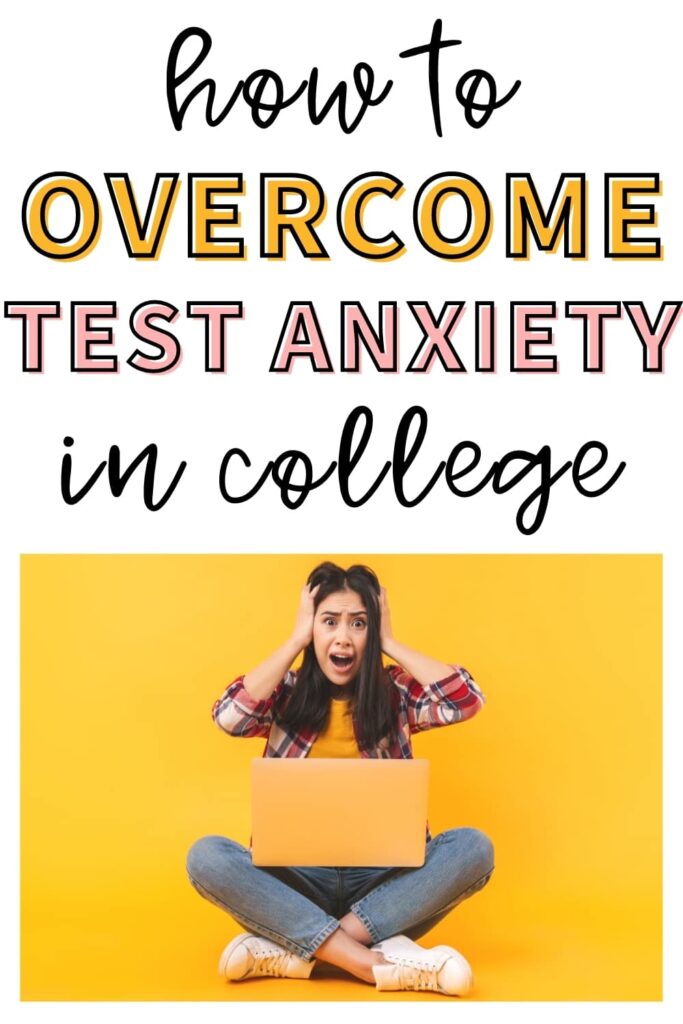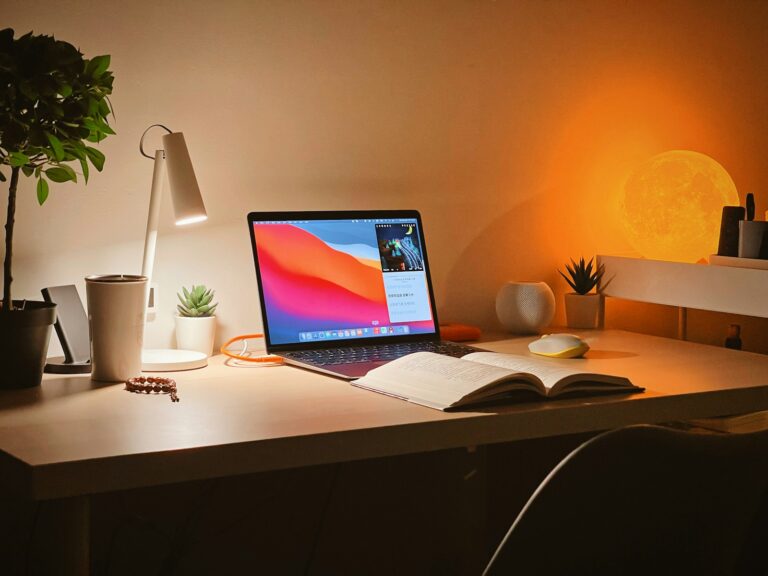11 Strategies to Help Manage Test Anxiety in College
Do you struggle with test anxiety in college? Learn how to overcome test anxiety with these 11 strategies to manage test anxiety.
Imagine this: you have studied for about a week for your final exam in your biology class.
You have attended every study session, read through every chapter in the book, watched videos online to complete your understanding of the topics, and even went to your professor for further clarification and tips for the final exam.
You feel prepared and you know you have prepared.
You sit down in class the day of the final exam, you receive your test face down (because your professor is just quirky), and when your professor tells you to start you flip over the test only draw a huge blank.
Sound familiar? If you’ve experienced this exact reaction on test day, you may have experienced test anxiety.
For many college students, heavily weighted grades, like tests, particularly midterm and final exams, can trigger anxiety and reduce a student’s ability to perform well in college.
Test anxiety can make learning in college not as enjoyable and some students may find they are not achieving the grades that reflect their true abilities.
If you are struggling with test anxiety, know that you are not alone and that there are ways to deal with test-taking anxiety in college.
In today’s blog post we will be discussing how to deal with test anxiety in college. We’ll first define what test anxiety is, discuss its prevalence, and then discuss 11 strategies to manage test anxiety in college.
- Do you struggle with test anxiety in college? Learn how to overcome test anxiety with these 11 strategies to manage test anxiety.
- What is test anxiety?
- How prevalent is test anxiety in college students?
- Does test anxiety last for forever?
- 11 strategies to manage test anxiety in college
- Concluding thoughts on how to reduce test anxiety in college
- Thanks for reading about how to reduce test anxiety in college.

*This post may contain affiliate links. Purchasing a product or service through an affiliate will earn me a small commission at no additional cost to you. Please read our Disclaimer Policy for more information about the use of affiliate links on this site.
What is test anxiety?
Test anxiety is an emotional and or physical response to taking a test.
For some students, taking a test or knowing that they have to take a test will cause their palms to get sweaty, their heart to beat fast, or even to start shaking. Emotionally, college students with test-taking anxiety may feel nervous, overwhelmed, or fearful.
For some students, they will have a combination of both physical and emotional symptoms of test anxiety and may start crying or having a panic attack (I’ve unfortunately seen both as a teaching assistant).
Students with test-taking anxiety may also report “drawing a blank” or “mind going blank” right when they receive their test to start on or during the test as they approach a new question.
How prevalent is test anxiety in college students?
If you feel like you have or know you have test anxiety, understand and find comfort in the fact that you are not alone.
The American Test Anxieties Association report that approximately 16-20% of college students experience high levels of test anxiety and 18% experience moderate levels of test anxiety.
Unfortunately, some students with test anxiety may also fear seeking out help for their test anxiety. They may be afraid of looking stupid or not being good enough to be in college.
However, seeking guidance from a professional counselor or even reaching out to a professor or college faculty member you trust about your test anxiety can help you step in the right direction towards overcoming test anxiety.
Does test anxiety last for forever?
Test anxiety may be a one-time occurrence or can be long-term for college students and persist test after test. Sometimes, test anxiety can be situation, so you may not experience test anxiety in your art history class, but experience test anxiety in your physics class.
If you consistently struggle with test anxiety there are strategies you can learn and use to overcome test anxiety in college.
11 strategies to manage test anxiety in college
In this section, we will be discussing 11 ways to reduce test anxiety that you can start implementing for your next test.
1. Utilize effective study strategies.
Test anxiety may be the result of not studying enough or not studying using effective study strategies.
If you are studying with Netflix in the background, your best friend is in the room with you are you two are gossiping, or you are just not 100% focused on your study materials, it can be hard to retain the information needed to do well your test.
Not being confident in the course content can make you feel anxious at test time, so to remediate this it is in your best interest to make a study plan at the beginning of the semester and to utilize effective study strategies throughout the semester.
Creating a study plan can help you manage all of your courses and to gain a feeling of control over your college classes.
Your study plan should include, at minimum, all of your assignment due dates and dates for tests and quizzes, and when you plan to start studying for a certain test or quiz.
Once you create your study plan, you need to abide by it and utilize effective study strategies in combination.
Learning and using effective study strategies will not only help reduce test anxiety in college, but it can also help save you time studying, so it’s a win-win for you!
Effective study strategies are those that involve you actively engaging in your course materials.
For example, instead of typing your notes as you read from your textbook, you are handwriting your textbook notes.
Or instead of simply reading over your notes over and over again, you are trying to teach your best friend or roommate the test materials.
By using active study strategies you are engaging your brain more than simply typing away at a keyboard and not really absorbing what you are reading.
When you type your notes, you are just letting your fingers do most of the work instead of your brain.
Also, when you teach someone the materials you are required to know for your test, you are also providing yourself feedback about the gaps in your knowledge about a certain concept.
If you can’t explain it to someone else, how are you suppose to explain the concept on a free-response test question?
When utilizing effective study strategies, also make sure that you are using your time wisely while studying.
So instead of cramming the night before, try to spread out your studying throughout the week in small increments of time–like two hours a day for a week with breaks every 45 minutes.
The best time management strategy when studying, and the one that I personally recommend, is the Pomodoro Technique.
The Pomodoro Technique is incredible for students because it makes studying for a test feel less overwhelming.
Instead of looking at all your materials for your test at once and thinking, “oh my goodness–this is going to take me a week to review!”
The Pomodoro Technique has you simply sit down and review your test material for just 25-45 minutes at a time. And you’d be surprised how much material you can cover in that chunk of time.
You may also like: What Makes Successful Students Different? 17 Qualities of Good College Students
2. Find out how your test will be formatted.
One of the reasons why you may have test anxiety is because you are unsure how the test will be formatted. This may be particularly true if you are a control freak.
If your professor has not already discussed their test format during the first week of school or in the syllabus, I would recommend sending a polite email asking your professor how their tests are structured.
By knowing the structure or format of your test you can develop a more effective study strategy to align with the format of the test.
For example, if you know that your test will be multiple choice or matching, you can structure your study materials to reflect the format of a multiple-choice or matching test.
Quizlet, a free website for students to learn and practice study materials, allows you to create multiple choice or matching test questions from digital flashcards or what Quizlet calls a study set.
To access, you first need to create a free account with Quizlet, and then create a “new study set.” Afterwards, you can click on “Test” under the “Study” section on the left-hand side of the screen and play with the test options to create a test that reflects the type of questions that may be on the real test.
If your test, however, is primarily free-response questions then I would recommend teaching a friend, roommate, or a family member the concepts you are learning in class.
Also, when teaching someone else, make sure to phrase things in your own words, and having whomever you are teaching ask you questions as well. This can help further your knowledge on the concept and prepare you to think on the fly.
3. Prepare your test-taking materials the night before
Test anxiety can be triggered when your materials are unprepared on test day. The last thing you want on test day is to find out right before the test is handed out is that you don’t have a pen, #2 pencil, your calculator, and or your scantron.
To easily reduce this trigger, pack all the materials you will need for your test in your bookbag or purse the night before. Make sure to put your test materials in a place that won’t get ruined if its raining and that is easy to access.
Knowing that you can walk into class on test day and pull out the right test-taking supplies will make you feel more confident and allow you to actually focus on the test rather than how much time it would take you to sprint back to your dorm room to grab a #2 pencil. Or have to awkwardly ask the guy next to you if you could borrow a pencil…
You may also like: 19 Gifts For Stressed Out College Students
4. Arrive to class early on test day.
Probably one of the biggest fears for any college student is arriving to class late on test day.
And although it is rare, life does happen–your alarm clock fails to go off, you get in a car accident on the way to class, or your college dorm floods out of nowhere…
The best way to combat being late to class on test day is to simply arrive early.
Of course, this takes some planning on your part and probably getting up a little earlier than usual, but it will certainly pay off if there is some chance that everything in the world goes wrong on test day.
On test day, make the effort to get up even 10 minutes before your usual alarm clock time.
So instead of getting up at 6 AM, get up at 5:50 AM, to get ready for the day, have enough time to eat breakfast (especially if you are not normally a breakfast eater), and double check that you have all your test materials that you need.
If you are a commuter college student, try leaving your house or apartment a little earlier too, so that if you get stuck in traffic you won’t be panicking at every red light.
By making the effort to arrive early to class on test day, you are able to show up to your classroom, take some moments to brush up on some test material, and mentally calm down before your test.
It’s definitely better than showing up to class right as the door opens or sprinting up 5 flights of stairs because you are already 5 minutes late for your test.
5. Try to avoid pre-test conversations with your classmates.
It’s normal to want to know how your other classmates are feeling about an upcoming test or to get a test concept re-explained by a classmate. However, talking to your classmates before a test may trigger your test anxiety.
Let’s say that you spent hours studying for an upcoming exam and you’re still a little fuzzy on it. But then you talk to your classmate, let’s call her Betty, and Betty explains the concept A LOT different than what you had studied.
Although Better may know what she is talking about and it makes sense to her, she may cause you to start panicking and start to think that you studied everything entirely wrong, you start overthinking everything, and on the test, you are second-guessing every response you make.
This is not a situation you want to get into right before a test and just so we’re clear, second-guessing is not a good test-taking strategy either.
I would avoid at all cost talking to your classmates before a test–even if it is your best friend.
Instead, focus on what you know, staying calm before your test, thinking positively, and just be confident in knowing that you studied to the best of your abilities with the materials available to you.
6. Practice breathing exercises.
When you are anxious, you may find your heart racing, your palms getting sweaty, and yourself feeling hot all of the sudden.
One of the best strategies to reduce test anxiety (and anxiety in general) and calm down before a test in college is to practice breathing exercises. What boxed breathing does is that it tricks your body to come out of the fight or flight response, which is what your anxiety is triggering.
Breathing exercises can be done right before a test, don’t take up any room at all, and can be done quietly.
One of my favorite breathing exercises is boxed breathing or squared breathing. Essentially what you do is you breathe in for 4 seconds, hold your breath for 4 seconds, and then exhale for 4 seconds. You’ll want to repeat this four times.
While you are performing this exercise, think about how it feels when you inhale and exhale. Through boxed breathing, I have learned to appreciate and be grateful for my lungs and enjoy the feeling of inhaling and exhaling.
You may also like: 17 Self-Care Activities For Stressed College Students
7. Jot down everything you know on the test before looking at the questions.
This is a strategy I learned from one of my professors during my undergraduate degree. Essentially, every test she gave us, she would always lay it face down on the table and no one was allowed to flip it over or start writing on the test until she said, “start.” However, she advised us that once she said “start” to not flip over the test.
Instead, she said to take the first five minutes or so to write down whatever we could recall from memory that might help us on the test.
That way, once we flipped over the test, we would have notes to help jog our memory again in case our minds went blank while reading test questions. Genius!
I highly advised, if your professor lets you write on your test, just do a huge brain dump of all the information you already know before you start taking your test.
You can write down formulas or equations, definitions, and even acronyms you’ve come up with to help you memorize a series of things.
8. Don’t get fixated on one question.
When you are taking a test, time is of the essence. But knowing the clock is ticking down can make your test anxiety worse.
If you find yourself getting stuck or drawing a blank on a question, don’t spend too much time on it. Just circle it to come back to later or choose an answer if its multiple choice and move on.
It’s way better to answer all the questions you know or kinda know rather than be fixated on one question, struggle to finish the rest of the test, and feel even more anxious trying to complete your test.
When I take an exam, I circle any questions I am not 100% sure about and make a checkmark on the questions that I am sure I got the answer right on.
Once I finish answering all of the questions on the test I go back through and spend the remainder of the test time working on the questions I circled.
9. Try to filter out the noise of other students turning in their tests.
One thing that seriously triggered my test anxiety during high school and college was hearing other students getting up to turn in their test.
In my head I always thought:
- How did they finish so quickly?!
- Am I falling behind…? What time is it?
- Should I be doing this faster? What is wrong with me?
However, don’t get caught up in the progress of your classmates.
If they finish their test faster than you, then so be it. When it comes to test taking, slow and steady wins the race.
Don’t let your other classmates trick your brain to thinking that time is up on your test.
Just remain hyper focused on the single most important thing: your own test.
It does take some time to learn how to filter out the noise of other students.
It may also be slightly awkward being the last or second to last student left taking their test, but hopefully, it will all pay off when you’re the one with the highest grade on their test!
And you can pat yourself on the back for overcoming test anxiety!
10. Stay positive before, during, and after the test.
When we allow negative thoughts to intrude our minds before a test, it can be hard to manage our test anxiety.
Based on the concept of self-fulfilling prophecy, thinking negatively about a test can potentially set you up for failure and make you think the test is harder than it actually is before even taking the test.
However, if you rewire your brain to think positively before, during, and after a test, it can help you cope with test anxiety and perceive the test as more manageable and even relatively easy.
How to stay positive during exams?
- Use positive affirmations to boost your confidence as a test taker. Tell yourself, “I know I am going to do great on this test.” Rather than, “I should have studied more. I know absolutely nothing.”
- Be confident in the materials you studied. You worked hard setting aside the time and effort to study for this exam.
- Accept the fact you cannot change how you did on the test, but you can learn and grow from your mistakes.
- Be grateful for the opportunity. Many people would love to have the chance to further their education and potentially get a higher paying job. Of course, this does not take away the fact that being in a college and taking tests is difficult.
11. Visit your university’s psychological services or counseling office if the issue persists.
Unfortunately, sometimes your test anxiety will be difficult to overcome by yourself with the strategies mentioned in this post or other resources from around the internet.
When you are unable to manage your test anxiety in college by yourself that doesn’t mean you should give up or drop out of college. Instead, I encourage you to utilize your university’s psychological services or counseling office.
There could be other underlying psychological issues that could be triggering your test anxiety, like depression, generalized anxiety disorder, or PTSD, that can make dealing with test anxiety in college more challenging for you.
A licensed psychologist or a psychologist in training at your university can help you develop and learn more strategies to help you manage your test anxiety and help you resolve the underlying cause(s) of your test anxiety.
There may even be group therapy sessions targeted towards college students with also struggle with test anxiety. And those group therapy sessions can be great to learn new and effective strategies to help reduce test anxiety in college and feel not so alone as well.
And bonus, going to the psychological services at your university, will most likely be “free” because you pay for the services with your tuition and fees at the beginning of the semester, so go ahead and take full advantage of the opportunity.
Concluding thoughts on how to reduce test anxiety in college
Test anxiety can turn a seemingly harmless test into a nightmare for many college students. With the amount of pressure college students are under these days to make the perfect grades, there’s no question as to why many college students develop test anxiety.
Luckily, test anxiety can be managed and there are a lot of strategies to help you reduce your test anxiety. In this blog post, we went over how to deal with test anxiety in college and 11 strategies you can try to manage test anxiety in college.
Here are 11 strategies that may help you overcome test anxiety in college:
- Utilize efficient study strategies, specifically those that encourage active learning rather than passive learning.
- Find out how your test will be formatted and structure your study methods around that format.
- Prepare your test-taking materials the night before.
- Arrive to class early on test day.
- Avoid talking to your classmates before the test about test materials.
- Practice breathing exercises, like boxed breathing.
- Jot down everything you know before looking at the test questions.
- Don’t get fixated on one question. If you don’t know the answer, take an educated guess, move one, and come back to it later.
- Try to filter out the noise of other students turning in their tests.
- Stay positive before, during, and after the test by using positive affirmations and reflecting on how you studied.
- Visit your university’s psychology services or counseling office if your test anxiety persists.
Related posts to managing test anxiety in college
- Everything You Need To Know About Summer College Courses
- College 101: Zoom Classroom Etiquette For College Students
- How To Stay Motivated In College: 15 Student Motivation Tips
- The Ultimate Survival Guide To Online College Classes
If you found this blog post helpful, please share it on Pinterest using the Pinterest share button down below.








